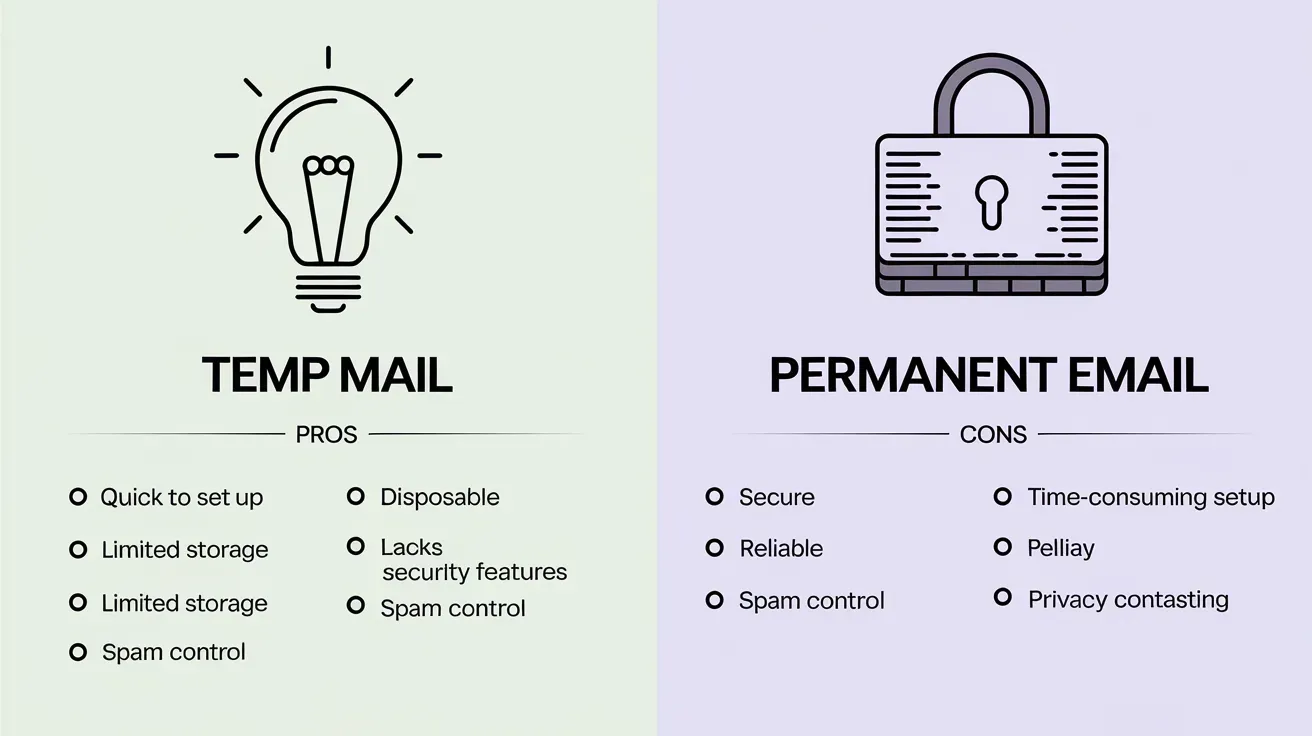Introduction
In an era where digital communication is paramount, the choice between using a temporary email (temp mail) and a permanent email is crucial for users concerned about privacy and security. Whether you’re signing up for a new service, subscribing to newsletters, or engaging in online transactions, understanding the differences between temp mail and permanent email can help you make an informed decision. In this article, we delve deep into the pros and cons of both options, providing you with the insights needed to choose the best email solution for your needs.
What is Temp Mail?
Temp mail refers to a temporary email address that users can generate for short-term use. These addresses allow you to receive emails without exposing your primary email address. Typically, temp mail services automatically delete emails after a certain period, making them ideal for one-time use cases.
Pros of Temp Mail
Privacy Protection
Using temp mail helps protect your personal information. When signing up for services, you can avoid giving out your primary email address, reducing the risk of your data being sold or misused.
Spam Reduction
One of the most significant advantages of temp mail is the reduction of spam. Since these email addresses are temporary, any spam that might come through won’t clutter your primary inbox.
Easy and Fast to Set Up
Temp mail services allow users to generate an email address with just a few clicks, often without any registration. This ease of use is perfect for those who need an email address quickly.
No Long-Term Commitment
Since temp mail addresses are short-lived, you can discard them without any consequences. This feature is particularly useful for one-time registrations or short-term projects.
Ideal for Testing
Developers and testers can use temp mail for testing purposes, allowing them to sign up for services without affecting their main email accounts.
Cons of Temp Mail
Limited Lifetime
The primary drawback of temp mail is its limited lifespan. Most temp mail services delete emails after a specific period, meaning you may not have access to important messages later.
Security Risks
While temp mail can protect your primary email, it can also expose you to risks. If the service provider fails to secure their servers, your data could be compromised.
Not Suitable for Sensitive Communications
Temp mail should not be used for sensitive transactions, such as banking or legal correspondence, as it lacks the security and permanence of traditional email services.
Limited Functionality
Many temp mail services provide basic features and lack advanced functionalities like calendar integration, file storage, or email management tools.
Potential for Abuse
Since temp mail addresses can be created easily, they are sometimes used for malicious activities, leading to blacklisting by certain websites.
What is Permanent Email?
Permanent email refers to a traditional email address that you use for ongoing communication. This type of email account is typically associated with an email provider like Gmail, Yahoo, Outlook, or your own domain.
Pros of Permanent Email
Reliability and Access
Permanent emails provide a reliable means of communication. You have continuous access to your inbox and can retrieve old messages anytime.
Security Features
Most permanent email providers offer robust security features, such as two-factor authentication and spam filtering, protecting your account from unauthorized access and phishing attempts.
Professionalism
Using a permanent email address, especially one associated with your domain, conveys professionalism. This is crucial for business communications and building credibility.
Advanced Features
Permanent email accounts come with various features, including calendars, cloud storage, and email management tools, enhancing productivity and communication.
Suitable for Sensitive Communications
For important transactions, permanent emails are a better option as they provide a stable and secure platform for exchanges.
Cons of Permanent Email
Spam Exposure
Unlike temp mail, permanent email addresses are more susceptible to spam. Once your email is out there, it can be sold or leaked, leading to unwanted advertisements.
Privacy Concerns
Many email providers track user data for advertising purposes. This practice can raise privacy concerns among users who value anonymity.
Time-Consuming Setup
Setting up a permanent email account can be more time-consuming compared to temp mail, as it often requires personal information and verification.
Account Maintenance
Users must periodically manage their accounts, including updating passwords, managing folders, and dealing with spam, which can be time-consuming.
Risk of Forgotten Credentials
If you forget your password or lose access to your recovery options, you could permanently lose access to important emails.
Temp Mail vs. Permanent Email: Key Differences
| Feature | Temp Mail | Permanent Email |
|---|---|---|
Lifespan | Temporary (hours/days) | Permanent (ongoing) |
Privacy | High | Variable (depends on provider) |
Spam Control | Excellent | Moderate |
Access to Old Emails | Limited | Unlimited |
Security Features | Basic | Advanced |
Professional Use | Not recommended | Highly recommended |
Setup Time | Immediate | Longer |
Conclusion
Choosing between temp mail and permanent email depends on your specific needs and preferences. Temp mail serves as an excellent solution for those prioritizing privacy and needing a quick, hassle-free email option for short-term use. In contrast, permanent email provides reliability, security, and a range of features suitable for long-term communication.
When to Use Temp Mail:
Signing up for newsletters or websites you don’t trust.
Participating in online contests or promotions.
Testing services without revealing your primary email.
When to Use Permanent Email:
Conducting business communications.
Managing sensitive information or transactions.
Regular correspondence with friends and family.
By understanding the pros and cons of each email type, you can make an informed decision that best suits your online activities. Remember to always prioritize your privacy and security when navigating the digital landscape.



